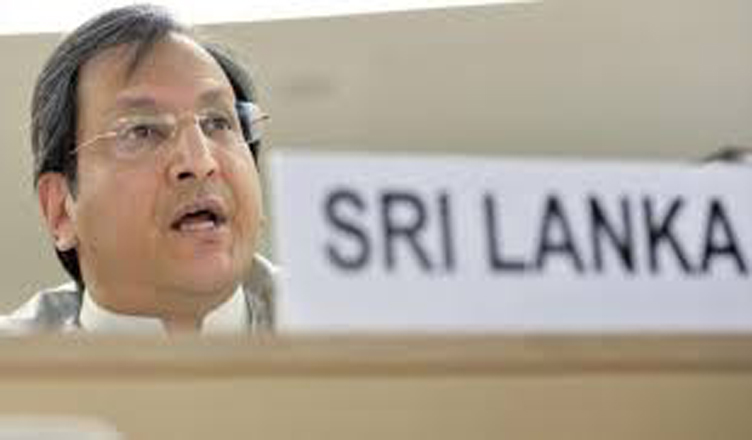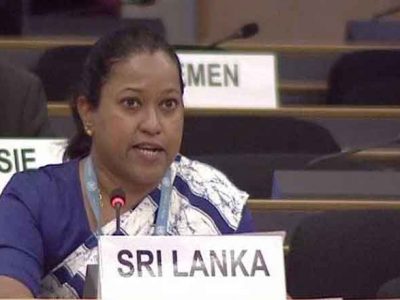(COLOMBO, LANKAPUVATH) –Sri Lanka’s Foreign Secretary Ravinatha Aryasinha said the investment environment in Sri Lanka for Indian investors is conducive not only because of its stable leadership but also due to the strong bilateral relationship between Sri Lanka and India.
Aryasinha said this was consolidated on following the early visits of the President, Prime Minister and the Foreign Minister to India where areas of cooperation was fully reviewed.
Addressing the webinar ‘Deepening Economic Collaboration between India and Sri Lanka’, organized by Federation of Indian Chambers of Commerce and Industry (FICCI) jointly with the Lakshman Kadirgamar Institute of International Relations and Strategic Studies, Sri Lanka (LKI), on 21 July 2020, Foreign Secretary Aryasinha said, India is among the top 5 foreign investors in Sri Lanka.
“The government is committed to facilitating, protecting and promoting the liberal investment climate in Sri Lanka by continuing to realign the systems and procedures to suit modern business needs. The prospective investors are encouraged to take advantage of these untouched investment opportunities in the island.”
Highlighting the potential areas of investment in Sri Lanka, he said that the government is targeting more investment in high value products. “India is strong in sectors like textiles, IT, agribusiness and the private sector of our two countries can explore collaboration related to investment, technology transfer in these sectors,” the Foreign Secretary added.
“In the manufacturing sector, we would welcome Indian businesses in developing industrial zones, automotive components, pharma, textiles and engineering, which are areas that could offer huge potential. The ongoing infrastructure improvement projects and development of roads, ports and airports will contribute and facilitate connecting linkages for the business sector,” he added.
The Secretary noted that Sri Lanka also has enormous potential as a tourist destination, given that Indians are approximately 20% of our tourist arrivals. Investment opportunities could be considerable in this sector as well, following in the footsteps of the Taj and ITC groups’ profitable investment in the hospitality sector, which has also contributed to boosting the quality of Sri Lankan tourism.
Emphasizing on the policy reforms undertaken by the government, he said, “We are taking a number of measures to strengthen the investment climate and investment laws are being reviewed to suit the modern-day requirement. All efforts of our government are to create an economy firmly based on foreign and domestic private investments, driven by a dynamic and forward-looking private sector.”
Elaborating on the bilateral trade between the two countries, Foreign Secretary Aryasinha said “India accounts for 20 percent of total Sri Lankan imports and is the third largest export destination for Sri Lanka. Commenting on Sri Lankan exports, he said that difficulties in market access, often created due to non-tariff barriers in receiving countries, has become an impediment to our farmers. He urged FICCI to collaborate with the Sri Lankan Mission in New Delhi to particularly help boost the export of Sri Lankan spices and concentrates including pepper to the Indian market.
He added that in terms of exports, “Sri Lanka acts as a gateway not only to the Indian sub-continent, but also to affluent consumers in the European Union. This will clearly open new opportunities for Indian investors who can operate from Sri Lanka on a preferential basis, and access the large market of India, as well as the EU”.
High Commissioner of India to Sri Lanka Gopal Baglay, said that the current time calls for policies oriented to the future and the ones that balances the need for economic security with efficient utilization of complementary economic strengths of the two countries. “As India moves towards Atmanirbhar Bharat (self-reliance), its integration with global supply and value chains will be an added opportunity for our close partners like Sri Lanka. This will build more long-term ties with our commercial entities and enhance capacities, promote employment and increase prosperity.
President, FICCI Dr Sangita Reddy said that healthcare and pharma are potential sectors of collaboration between India and Sri Lanka. Other focus sectors like tourism and hospitality have been strong areas of mutual interest. These two sectors are also among the worst affected as a result of the pandemic and we should discuss ways to rejuvenate them. She urged both governments to revive the India-Sri Lanka CEO forum to explore opportunities in business and investment. Chair, South Asia Regional Council, FICCI and President, Group Public Affairs & Member of the Group Executive Board, Mahindra & Mahindra Ltd., Manoj Chugh said that there are new sectors which are yet to be tapped and that Indian and Sri Lankan companies should form alliances to tap them. Chief Operating Officer, Ashok Leyland Nitin Seth; Co-Chair, South Asia Regional Council, FICCI and Director – International Business CNH Industrial (India) Pvt. Ltd. Ashok Anantharaman; Executive Director, Investment Promotion, Board of Investment of Sri Lanka Prasanjith Wijayatilake; Director, Tourism Planning, Development and Investor Relations, Sri Lanka Tourism Development Authority Dr Prasad Jayasuriya and Head of Business Development, Sri Lanka Institute of Nanotechnology Dr Lakshitha Pahalagedara also shared their perspective on strengthening India-Sri Lanka economic relationship. Board Member of the Lakshman Kadirgamar Institute Suganthie Kadirgamar, Additional Secretary Economic Affairs, P. Amza, Director General South Asia and SAARC Division Aruni Ranaraja of the Ministry of Foreign Relations and Acting High Commissioner of Sri Lanka to India Niluka Kadurugamuwa were also present during the webinar.




